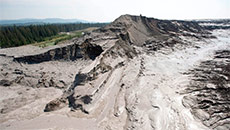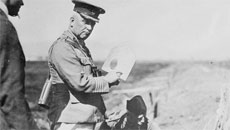OTTAWA - It's the street equivalent of a desert mirage, an elusive piece of prime parking real estate that, for some strange reason, everyone else just happened to miss.
Eventually, however, a telltale slip of paper tucked beneath a windshield wiper offers an explanation: you parked in front of a fire hydrant.
Maybe it was an honest mistake. Or maybe you thought you could slip in and out before your illegal parking job caught the attention of a passing bylaw officer. Either way, now you've been hit with a hefty fine.
And as it turns out, some hydrants seem to be more tempting — and more costly — than others.
In Toronto, one hydrant stands above the rest. People are fined so often for parking in front of it that on Google's Street View, a white Toyota can be seen with a yellow slip under its wiper blade as a parking-enforcement officer walks away.
Since 2008, cars that parked too close to the hydrant at 393 University Ave. have been ticketed 2,962 times. Those fines add up to $289,620 — more than any other hydrant in the city.
So, why is this one particular hydrant such a cash cow for the city? There are a few possible explanations. It's right by the courthouse and near a major downtown intersection. The hydrant itself is in the middle of a busy sidewalk set back some distance from the street, and it would be easy enough for drivers to miss. No markings on the street make it obvious that the spot is off-limits.
Anthony Fabrizi, the city's manager of parking ticket operations, says the hydrant needs to be a certain distance from the street so pumper trucks can park there.
"There's lots of logic to the madness when you see behind the scenes," Fabrizi said.
In Toronto, the fine for parking within three metres of a fire hydrant is $100. It used to be $30 until the city hiked the fine in early 2008.
A Canadian Press analysis of Toronto's parking-ticket data found the city has collected more than $24 million since 2008 by fining people who parked too close to hydrants.
Fabrizi says all parking fines, including those from parking next to hydrants, add up to $80 million a year.
That may seem like a big number, but Fabrizi says it only represents about one per cent of the money needed to run all of the city's programs.
"The amount of revenue that parking generates is so minuscule compared to the overall revenue that it really doesn't serve a great purpose as a revenue generator."
About half the revenue from parking tickets pays for parking enforcement and operations, he added.
"Parking is a bit of a funny business in terms of budgeting," Fabrizi said.
"We have to budget in terms of firm numbers the costs associated with enforcing parking. So we know that there's about a $50-million cost ... so that is a $50-million budget that has to be paid even if no parking tickets were issued.
"Historically, we see that parking tickets and fines, once it goes through the courts, generate about $80 million a year. So the program pays for itself and then there's a little bit of a margin, about $30 million extra."
Most parking tickets in Toronto are handed out to people who let their parking meters expire or who park in no-parking areas. Tickets for parking too close to fire hydrants only accounted for 1.45 per cent of all parking infractions last year.
While the hydrant at 393 University Ave. is by far the city's golden goose, many others are also quite lucrative.
At 33 Elmhurst Ave., a hydrant lurks in the shadow of a large condo building in North York. Vehicles that parked there have been ticketed 2,253 times since 2008, with fines totalling $207,030.
A nearby federal government building may explain all the parking tickets. The Joseph Shepard building houses branches of Passport Canada, a Canadian Forces recruiting centre and several other federal departments.
If you're visiting Toronto's Mount Pleasant Cemetery, don't park in front of the fire hydrant at 113 Merton St. This unassuming hydrant, tucked between two trees, is the city's third most-ticketed spot, with 2,165 fines handed out amounting to $212,300.
The city also tracks the province or state on the licence plates of people who get fined for parking too close to hydrants. Not surprisingly, almost every ticketed vehicle had Ontario plates. Drivers with Quebec plates were a distant second, followed by visitors from New York and Alberta.
But pity the two poor drivers with Hawaiian plates, who came a long way only to get busted for parking in front of hydrants.





